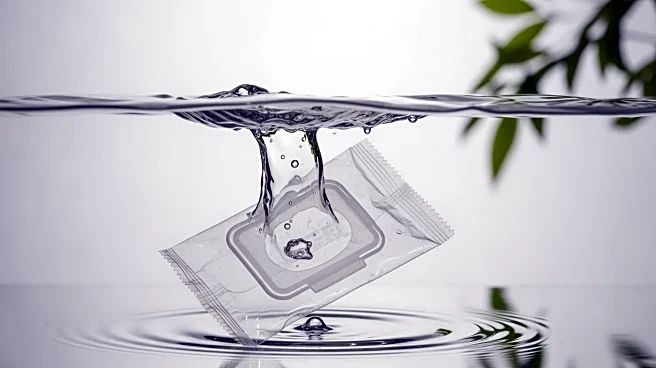What's Happening?
England has enacted a ban on the sale and supply of wet wipes containing plastic, set to take effect in 2027. The ban aims to tackle pollution caused by wet wipes, which can block waterways, create 'fatbergs' in sewer systems, and break down into microplastics
that poison wildlife and enter the food chain. The legislation includes exemptions for medical professionals and provides an 18-month transition period for retailers to sell existing stock. The Welsh government has already introduced similar legislation, and Northern Ireland and Scotland are expected to follow suit.
Why It's Important?
The ban on plastic wet wipes in England represents a significant step towards reducing pollution and protecting the environment. Wet wipes contribute to sewer blockages and microplastic pollution, posing risks to wildlife and human health. The legislation reflects growing awareness of the environmental impact of single-use plastics and the need for sustainable alternatives. The ban is expected to drive innovation in biodegradable materials and encourage consumers to adopt environmentally friendly practices. The move aligns with broader efforts to reduce plastic waste and promote sustainability.
What's Next?
As the ban takes effect in 2027, retailers and manufacturers will need to transition to biodegradable alternatives. The government may consider further restrictions on the manufacture of plastic wet wipes. Public awareness campaigns will likely emphasize the importance of proper disposal and encourage consumers to avoid flushing wet wipes. The legislation may prompt other regions to adopt similar measures, contributing to global efforts to reduce plastic pollution. Stakeholders will continue to advocate for policies that support environmental sustainability and protect natural ecosystems.
Beyond the Headlines
The ban on plastic wet wipes raises broader questions about consumer behavior and the role of legislation in driving environmental change. The transition to biodegradable alternatives reflects a shift towards sustainable consumption and the need for industry innovation. The legislation highlights the importance of balancing environmental goals with practical considerations, such as exemptions for medical use. The move underscores the need for collaborative efforts to address plastic pollution and promote sustainable practices across industries.
















